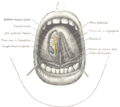Frenulum
Frenulum is a small fold of tissue that secures or restricts the motion of a mobile organ in the body. There are several frenula in different parts of the human body, such as those found in the mouth, digestive tract, and genitals.
Anatomy[edit]
The term "frenulum" is derived from the Latin word "frenum," which means "bridle." In the human body, a frenulum is a fold of tissue or muscle that supports an organ or structure, keeps it in place, and restricts its movement to a certain extent.
Oral Frenula[edit]
In the mouth, there are three frenula:
- The lingual frenulum under the tongue.
- The labial frenulum attaching the inside of the upper lip to the gums.
- The inferior labial frenulum attaching the inside of the lower lip to the gums.
Digestive Tract Frenula[edit]
In the digestive tract, there are two frenula:
- The frenulum of ileocecal valve in the gastrointestinal tract.
- The frenulum of appendix in the gastrointestinal tract.
Genital Frenula[edit]
In the genitals, there are three frenula:
- The frenulum of prepuce of penis in males.
- The frenulum of labia minora in females.
- The frenulum of clitoris in females.
Clinical Significance[edit]
The frenulum can sometimes be the site of certain medical conditions. For example, a short lingual frenulum (a condition known as ankyloglossia or "tongue-tie") can cause speech difficulties and problems with breastfeeding in infants. Similarly, a short frenulum of the penis can cause discomfort during sexual activities.
See Also[edit]
References[edit]
<references />
Ad. Transform your life with W8MD's Budget GLP-1 injections from $75


W8MD offers a medical weight loss program to lose weight in Philadelphia. Our physician-supervised medical weight loss provides:
- Weight loss injections in NYC (generic and brand names):
- Zepbound / Mounjaro, Wegovy / Ozempic, Saxenda
- Most insurances accepted or discounted self-pay rates. We will obtain insurance prior authorizations if needed.
- Generic GLP1 weight loss injections from $75 for the starting dose.
- Also offer prescription weight loss medications including Phentermine, Qsymia, Diethylpropion, Contrave etc.
NYC weight loss doctor appointmentsNYC weight loss doctor appointments
Start your NYC weight loss journey today at our NYC medical weight loss and Philadelphia medical weight loss clinics.
- Call 718-946-5500 to lose weight in NYC or for medical weight loss in Philadelphia 215-676-2334.
- Tags:NYC medical weight loss, Philadelphia lose weight Zepbound NYC, Budget GLP1 weight loss injections, Wegovy Philadelphia, Wegovy NYC, Philadelphia medical weight loss, Brookly weight loss and Wegovy NYC
|
WikiMD's Wellness Encyclopedia |
| Let Food Be Thy Medicine Medicine Thy Food - Hippocrates |
Medical Disclaimer: WikiMD is not a substitute for professional medical advice. The information on WikiMD is provided as an information resource only, may be incorrect, outdated or misleading, and is not to be used or relied on for any diagnostic or treatment purposes. Please consult your health care provider before making any healthcare decisions or for guidance about a specific medical condition. WikiMD expressly disclaims responsibility, and shall have no liability, for any damages, loss, injury, or liability whatsoever suffered as a result of your reliance on the information contained in this site. By visiting this site you agree to the foregoing terms and conditions, which may from time to time be changed or supplemented by WikiMD. If you do not agree to the foregoing terms and conditions, you should not enter or use this site. See full disclaimer.
Credits:Most images are courtesy of Wikimedia commons, and templates, categories Wikipedia, licensed under CC BY SA or similar.
Translate this page: - East Asian
中文,
日本,
한국어,
South Asian
हिन्दी,
தமிழ்,
తెలుగు,
Urdu,
ಕನ್ನಡ,
Southeast Asian
Indonesian,
Vietnamese,
Thai,
မြန်မာဘာသာ,
বাংলা
European
español,
Deutsch,
français,
Greek,
português do Brasil,
polski,
română,
русский,
Nederlands,
norsk,
svenska,
suomi,
Italian
Middle Eastern & African
عربى,
Turkish,
Persian,
Hebrew,
Afrikaans,
isiZulu,
Kiswahili,
Other
Bulgarian,
Hungarian,
Czech,
Swedish,
മലയാളം,
मराठी,
ਪੰਜਾਬੀ,
ગુજરાતી,
Portuguese,
Ukrainian



